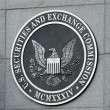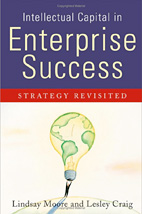The SEC has lifted an ancient ban that prevented advertising or the public solicitation of investors in private stock offerings. The new rule, which is part of the recent Jumpstart Our Business Startups Act of 2012, is meant to make it easier for hedge funds, private equity firms, and start-up businesses to find capital and create new jobs.
Intellectual Capital
"Intellectual capital assets" are those intangible, intellecual, knowledge-based assets that are the focus of strategic planning and the basis of competitve advantage in the global marketplace. They include, for example, brands, patents and other intellectual property, human capital, knowledge, know-how, and social capital.
Managerial Competencies and the Enterprise Asset Base
Companies often fail to notice that their asset base has or is shifting from traditional tangible assets to an intangible asset base, and that concurrently, their approach to strategy and management must also change to effectively deploy and leverage the shifting asset mix.
Towards a Strategy of Valuing Patents as Intellectual Capital
Patents are a major force in the world economy, and one of only a few metrics commonly employed to gauge the tides of new ideas and innovation that are driving our economy. Even with the present declining rates of R&D investment, leading nations spend over $1 billion dollars each day generating intellectual property.
The Strategic Positioning of Intangible Assets (PDF)
Patents, trademarks, copyrights and other intangibles are not worth anything if they sit in isolation. It requires individuals with vision and ability to understand their potential and to turn this into meaningful return by putting in place programmes that will maximise their value.
Patent Portfolios Can Attract Capital
As funds are withdrawn from declining investments, venture capitalists, hedge funds, private equity and institutional investors have substantial holdings to invest in the fundamentals of future market growth.
Building Market Capitalization With Intellectual Capital Assets
For every dollar of value contributed by tangible assets, two to four dollars more are being contributed to enterprise value by the intangibles. How can we make intangible assets, known as Intellectual Capital, actionable so we can use them to drive corporate valuation and stock price? Here is a simple way to think about the subject…
What Is Intellectual Capital?
An explanation of the seven areas of Intellectual Capital: the brand, intellectual property and goodwill, active intelligence, corporate culture, people, experience and history, the work product.
Non-Financial Performance Measurements
We are all well-acquainted with the traditional measures of enterprise performance. But today, under the influence of globalization, environmental crises, and widespread ethical breakdown there is pressure to identify and report new, non-traditional, and “non-financial” measures of performance to get at newly recognized dimensions of enterprise value, success, and significance. These new demands emerge from a belief that social, environmental, ethical, and geopolitical factors materially impact the ability of a company or enterprise to perform favorably.
PepsiCo Goes Natural
PepsiCo. Inc., the massive food and beverage conglomerate with a market capitalization of $73 billion and annual revenues in excess of $27 billion, has announced their intention to migrate their snack food and beverage offerings to a more healthy profile, and to encourage the moderate consumption of snack foods.


 As the knowledge-based economy expands, the companies and individuals that possess intangible intellectual assets, such as intellectual property, will need specialized expertise, strategic thinking, legal experience, and the wisdom necessary to manage intellectual assets.
As the knowledge-based economy expands, the companies and individuals that possess intangible intellectual assets, such as intellectual property, will need specialized expertise, strategic thinking, legal experience, and the wisdom necessary to manage intellectual assets.